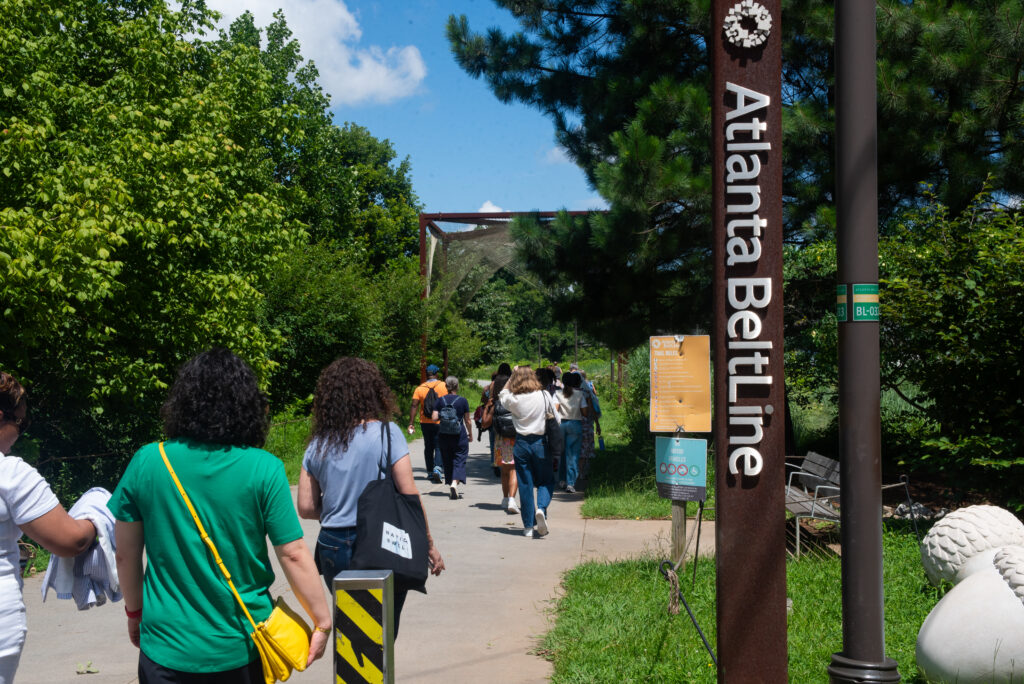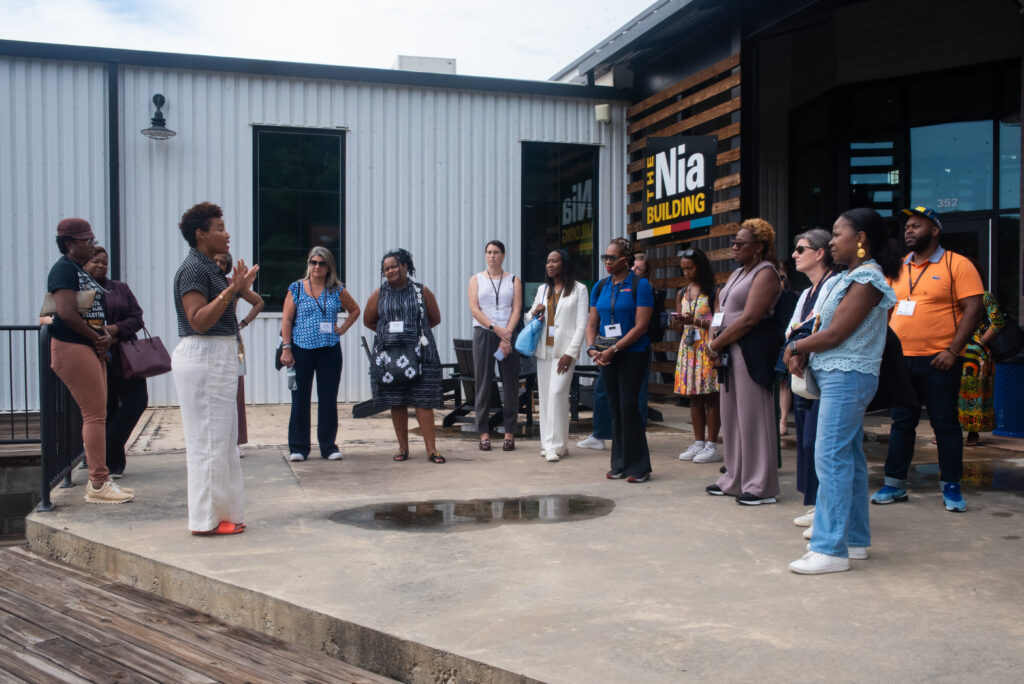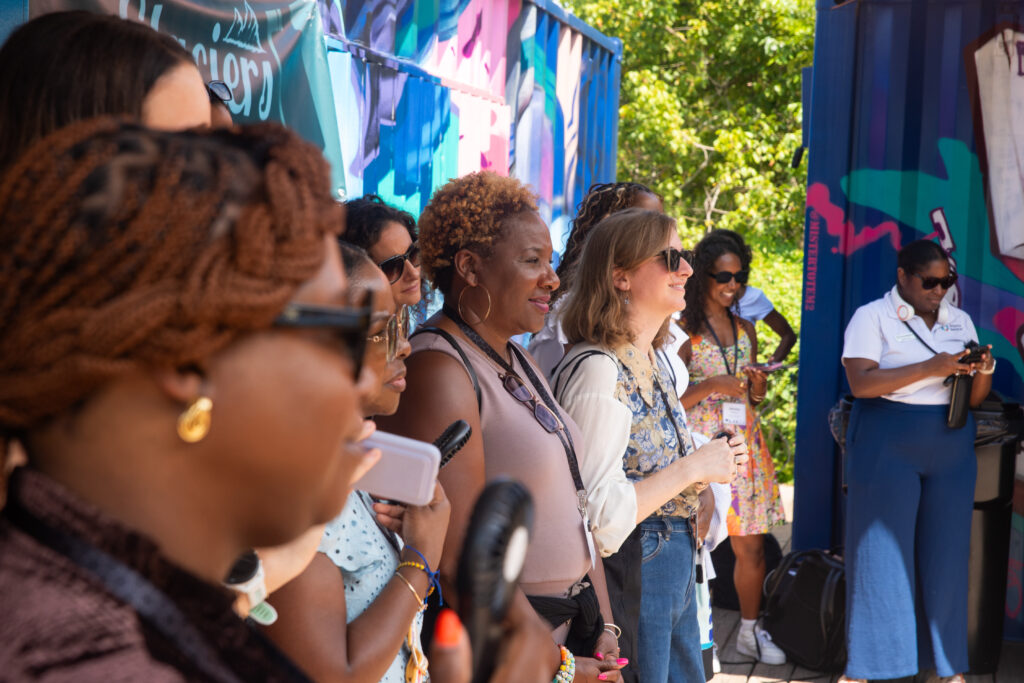This summer, as part of NationSwell’s Place-based Impact Collaborative, we explored the power of community-led change through an immersive experience in Atlanta, GA. This experience would not have been possible without our host, The Annie E. Casey Foundation.
As place-based work popularizes, new actors should pay attention: nearly 25 years into their place-based commitment to the city, what the Foundation is building in Atlanta is a testament to place-based investment done right. Long-term, community-rooted, structurally sound, and boldly committed to building a brighter future for youth, families and communities the Annie E. Casey Foundation is unwavering in striving toward greater opportunity for all Atlantans.

Why Atlanta?
Many view Atlanta as a booming metro hub, but it is also the city with the lowest rate of economic mobility in the United States. A child born into poverty in Atlanta has less than a 4% chance of escaping it. The Annie E. Casey Foundation established its Atlanta Civic Site in 2001, recognizing the city’s unique potential, alongside its stark disparities.
“Atlanta has a vibrant economy (one of the fastest growing in the country) and rich culture,” says Tomi Hiers, “It continues to be an attractive city, as its rapidly growing population shows.”
But as she points out, “Atlanta has one of the country’s fastest-growing economies, but that growth is uneven across its communities….Communities along and below I-20 continue to face some of the most persistent poverty rates in the country.”
A three-pronged approach: The Foundation’s theory of change in Atlanta
The Foundation’s commitment in Atlanta is long-term and multifaceted, focusing on three investment pillars: economic opportunity, neighborhood transformation, and educational achievement.
“Atlanta is the Annie E. Casey Foundation’s second hometown (Baltimore is the other),” says Hiers, “We encourage action and transformation in Atlanta through a combination of strategic partnerships and investments, spanning beyond individual neighborhoods. Our work continues to be undergirded by the belief that strong communities are possible when young people have the family connections, relationships, communities and educational and employment opportunities they need to thrive.”

Neighborhood transformation: Pittsburgh Yards
Home to the Foundation’s Atlanta Civic Site is Pittsburgh Yards, a 31-acre development in Atlanta’s historic Pittsburgh neighborhood — a community founded by formerly enslaved people in 1883. The south side of Atlanta carries deep scars from redlining, disinvestment, and broken promises, but it also holds the legacy of resistance, culture, and community pride. It’s here that Pittsburgh Yards rises, not just as a development, but as a reclamation of possibility.
Pittsburgh Yards is both a business hub and a model of community-driven development. After purchasing the site in 2006, the Foundation undertook a years-long design process that engaged local residents and businesses. This investment resulted in the Nia Building (Swahili for “purpose”), which now houses over 100 office spaces and supports nearly 160 local businesses through both leased spaces and accessible co-working memberships.
With property values near the Beltline increasing by over 500% in just five years, the Foundation’s investments are carefully designed to prevent displacement. From affordable leases to technical assistance and business development programming, Pittsburgh Yards is a market disruptor in commercial real estate.

Economic opportunity: Supporting local entrepreneurs
Many entrepreneurs in Atlanta, limited by social and economic barriers, are unsure if the city has room for their dreams; targeted investments from the Annie E. Casey Foundation support small business owners through space and ownership, reshaping how they imagine their futures.
The Foundation partners with organizations like Our Village United and the Russell Innovation Center for Entrepreneurs (RICE), which provide coaching, funding access, and business strategy training. Entrepreneurial support at Pittsburgh Yards is not limited to real estate. Innovative models like the container courtyard, a marketplace of rotating micro-retailers and food vendors built from shipping containers, have provided flexible, low-barrier entry points for businesses to scale and test new concepts.
Hiers highlights the urgency of this work: “Even when it comes to entrepreneurship, one of the primary drivers of wealth, company owners from certain demographics lag behind, creating a gap in revenue generation.”
Educational achievement: Starting from birth
Approximately 8 out of every 20 children in Atlanta aged 0-5 are considered economically disadvantaged, with 5 of them living in poverty. The Foundation’s commitment to educational achievement begins in early childhood. Through supporting initiatives like “Promise All Atlanta Children Thrive” (PACT), the Foundation has galvanized a citywide action to make Atlanta the best place to raise a child.
Partners like GEEARS (Georgia Early Education Alliance for Ready Students) have helped build a collaborative that includes public and private leaders, all aligned around improving outcomes for children from birth to five. This coalition has led to coordinated grantmaking, Head Start provider collaboration, childcare stabilization grants during the pandemic, and aligned advocacy to shape systems and policy change.

A culture of collaboration and honoring legacy
What sets the Annie E. Casey Foundation’s approach apart is its commitment to authentic collaboration. Both cross-sector and community efforts are designed with shared purpose, long-term structure, and community voice. The Foundation’s partners reflect that spirit — from housing advocates and public health leaders to artists, educators, and entrepreneurs.
“I learned very early in my career that people with lived experience and those who are closest to challenges have unique perspectives that can lead to innovative and lasting solutions. I have made it a priority to ensure that people who live in the communities where work takes place or those who participate in targeted programs have a voice in helping to set priorities, developing strategy and getting the work done.”
This immersive experience was offered to NationSwell through the NationSwell Collaboratives. To learn more or get involved, visit nationswell.com/nationswell-collaboratives/

 "
"